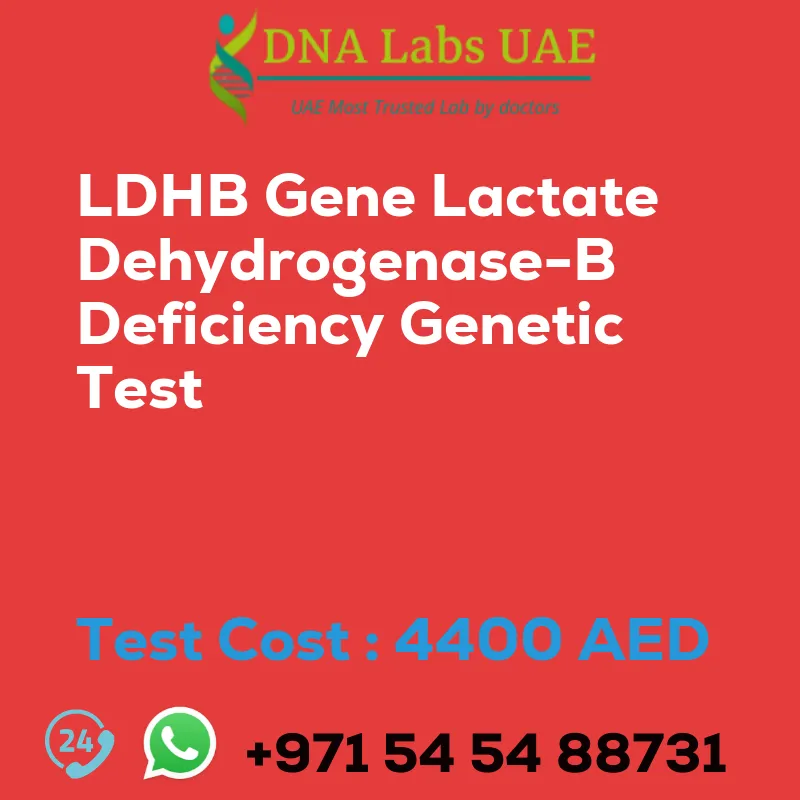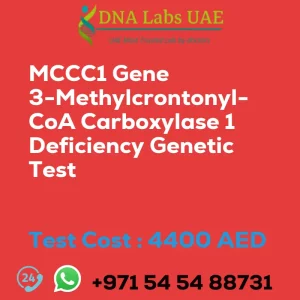LDHB Gene Lactate dehydrogenase-B deficiency Genetic Test
Genetic testing plays a crucial role in diagnosing and understanding rare genetic disorders such as LDHB Gene Lactate dehydrogenase-B deficiency. LDHB gene is responsible for encoding the enzyme lactate dehydrogenase-B (LDH-B), which is vital for energy metabolism. LDH-B deficiency is a rare genetic disorder characterized by reduced or absent activity of the LDH-B enzyme.
To diagnose LDH-B deficiency, a Next-Generation Sequencing (NGS) genetic test can be performed. NGS is a high-throughput sequencing method that allows for the simultaneous analysis of multiple genes or even the entire genome. In the case of LDH-B deficiency, the NGS test focuses specifically on sequencing the LDHB gene to identify any genetic variations or mutations that may be causing the deficiency.
The LDHB Gene Lactate dehydrogenase-B deficiency Genetic Test is available at DNA Labs UAE. The cost of the test is AED 4400.0. The test can be conducted using a blood sample, extracted DNA, or even one drop of blood on an FTA card. The report delivery usually takes 3 to 4 weeks.
The LDHB Gene Lactate dehydrogenase-B deficiency Genetic Test falls under the category of Metabolic Disorders and is conducted by General Physicians in the Genetics department of DNA Labs UAE.
Prior to the test, it is important to provide the clinical history of the patient who is going for the test. Additionally, a Genetic Counselling session is recommended to draw a pedigree chart of family members affected by Lactate dehydrogenase-B deficiency. This information helps in understanding the inheritance pattern and making an accurate diagnosis.
The NGS test for LDH-B deficiency starts by extracting DNA from a blood or saliva sample. The DNA is then fragmented and prepared for sequencing. Next, the DNA fragments are sequenced using NGS technology, which generates millions of short DNA sequences. These short sequences are aligned and analyzed using specialized software to identify any variations or mutations in the LDHB gene.
By identifying specific genetic variations or mutations in the LDHB gene, the NGS test can confirm a diagnosis of LDH-B deficiency. This information is crucial for genetic counseling, understanding disease progression, and potentially developing targeted treatments in the future.
| Test Name | LDHB Gene Lactate dehydrogenase-B deficiency Genetic Test |
|---|---|
| Components | |
| Price | 4400.0 AED |
| Sample Condition | Blood or Extracted DNA or One drop Blood on FTA Card |
| Report Delivery | 3 to 4 Weeks |
| Method | NGS Technology |
| Test type | Metabolic Disorders |
| Doctor | General Physician |
| Test Department: | Genetics |
| Pre Test Information | Clinical History of Patient who is going for LDHB Gene Lactate dehydrogenase-B deficiency NGS Genetic DNA Test A Genetic Counselling session to draw a pedigree chart of family members affected with Lactate dehydrogenase-B deficiency |
| Test Details |
LDHB gene is responsible for encoding the enzyme lactate dehydrogenase-B (LDH-B), which plays a crucial role in energy metabolism. LDH-B deficiency is a rare genetic disorder characterized by a reduced or absent activity of the LDH-B enzyme. To diagnose LDH-B deficiency, a Next-Generation Sequencing (NGS) genetic test can be performed. NGS is a high-throughput sequencing method that allows for the simultaneous analysis of multiple genes or even the entire genome. In the case of LDH-B deficiency, the NGS test would focus specifically on sequencing the LDHB gene to identify any genetic variations or mutations that may be causing the deficiency. The NGS test starts by extracting DNA from a blood or saliva sample. The DNA is then fragmented and prepared for sequencing. Next, the DNA fragments are sequenced using NGS technology, which generates millions of short DNA sequences. These short sequences are then aligned and analyzed using specialized software to identify any variations or mutations in the LDHB gene. By identifying specific genetic variations or mutations in the LDHB gene, the NGS test can confirm a diagnosis of LDH-B deficiency. This information can be useful for genetic counseling, understanding disease progression, and potentially developing targeted treatments in the future. |








